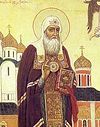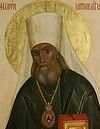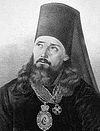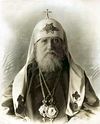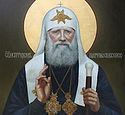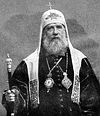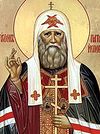

| Previous day | Next day |
| Old Style
October 5
|
Monday |
New Style
October 18
|
| 18th Week after Pentecost. Tone 8. | No fast.
|
![]() Martyr Charitina of Amisus (304).
Martyr Charitina of Amisus (304). ![]() Sts. Peter (1326), Alexis (1378), Jonah (1461), Macarius (1563), Philip (1569), Job (1607), Hermogenes (1612), Philaret (1867), Innocent (Veniaminov) (1879), Tikhon (1925), Macarius (Nevsky) (1926), and Peter (Polyansky) (1937), hierarchs of Moscow.
Sts. Peter (1326), Alexis (1378), Jonah (1461), Macarius (1563), Philip (1569), Job (1607), Hermogenes (1612), Philaret (1867), Innocent (Veniaminov) (1879), Tikhon (1925), Macarius (Nevsky) (1926), and Peter (Polyansky) (1937), hierarchs of Moscow.
Hieromartyrs Dionysius, bishop of Alexandria, and the deacons Gaius and Faustus (264-265). Martyr Mamelta (Mamelchtha) of Persia (ca. 344). St. Gregory (Grigol), archimandrite, of Khandzta in the Klarjeti desert, Georgia (861). St. Damian the Healer, priest (1071), and Sts. Jeremiah (ca. 1070) and Matthew (ca. 1085), clairvoyants, of the Kiev Caves. St. Charitina, princess of Lithuania (1281). St. Varlaam, desert-dweller, of Chikoysk (1846). St. Seraphim (Amelin), schema-archimandrite, of Glinsk Hermitage (1958). Uncovering of the relics of New Hiero-confessor Basil (Preobrazhensky), bishop of Kineshma (1985).
New Hiero-confessor Gabriel (Igoshkin), archimandrite, of Melekess (Saratov) (1959).
Synaxis of the holy fellow-strugglers of St. Gregory of Khandzta (9th c.). St. Cosmas, abbot, in Bithynia (10th c.). St. John (Mavropos), metropolitan of Euchaita (1100). St. Matthew, founder of St. Nicholas-Cherneyev Monastery (Mordovia) (after 1573). St. Methodia, recluse, of Cimola (1908). Uncovering of the relics of St.Eudocimus the Unknown, monk of Vatopedi, Mt. Athos (1841).
Repose of Nun Agnia (Countess Anna Orlova-Chesmenskaya) of Novgorod (1848) and Hieroschemamonk Paisius (Olaru) of Sihastria, Romania (1990).
Thoughts for Each Day of the Year
According to the Daily Church Readings from the Word of God
By St. Theophan the Recluse

Monday. [Phil. 2:12-16; Luke 6:24-30]
Woe to those who are rich, who are full, who laugh, and who are praised. But good shall come to those who endure every wrongful accusation, beating, robbery, or compulsory difficulty. This is completely opposite to what people usually think and feel! The thoughts of God are as far from human thoughts as heaven is from the earth. How else could it be? We are in exile; and it is not remarkable for those in exile to be offended and insulted. We are under a penance; the penance consists of deprivations and labours. We are sick; and most useful for the sick are bitter medicines. The Saviour Himself all of His life did not have a place to lay His head, and He finished his life on the cross—why should his followers have a better lot? The Spirit of Christ is the spirit of preparedness to suffer and bear good-naturedly all that is sorrowful. Comfort, arrogance, splendour, and ease are all foreign to its searching and tastes. Its path lies in the fruitless, dreary desert. The model is the forty-year wandering of the Israelites in the desert. Who follows this path? Everyone who sees Canaan beyond the desert, boiling over with milk and honey. During his wandering he too receives manna, however not from the earth, but from heaven; not bodily, but spiritually. All the glory is within.
Articles
 Martyr Charitina of AmisusThe Martyr Charitina of Rome was orphaned in childhood and raised like a daughter by the pious Christian Claudius. |
 St Jonah the Metropolitan of MoscowSaint Jonah, Metropolitan of Moscow and Wonderworker of All Russia, was born in the city of Galich into a pious Christian family. |
 Icon of St. Innocent of Moscow weeping myrrh In KhabarovskThe unusual phenomenon was noticed by the seminary aspirants who came to take entrance examinations. |
 Hieromartyr Dionysius the Bishop of AlexandriaSaint Dionysius, Bishop of Alexandria, was the son of wealthy pagan parents. He converted to Christianity at a mature age, and became a pupil of Origen. |
 Martyr Memelchtha of PersiaThe Martyr Memelchtha of Persia was, before her conversion to the Christian Faith, a pagan priestess of the goddess Artemis. |
 St. Gregory of Chandzoe in GeorgiaOur Holy Father Gregory of Khandzta was raised in the court of the Kartlian ruler Nerse. |








